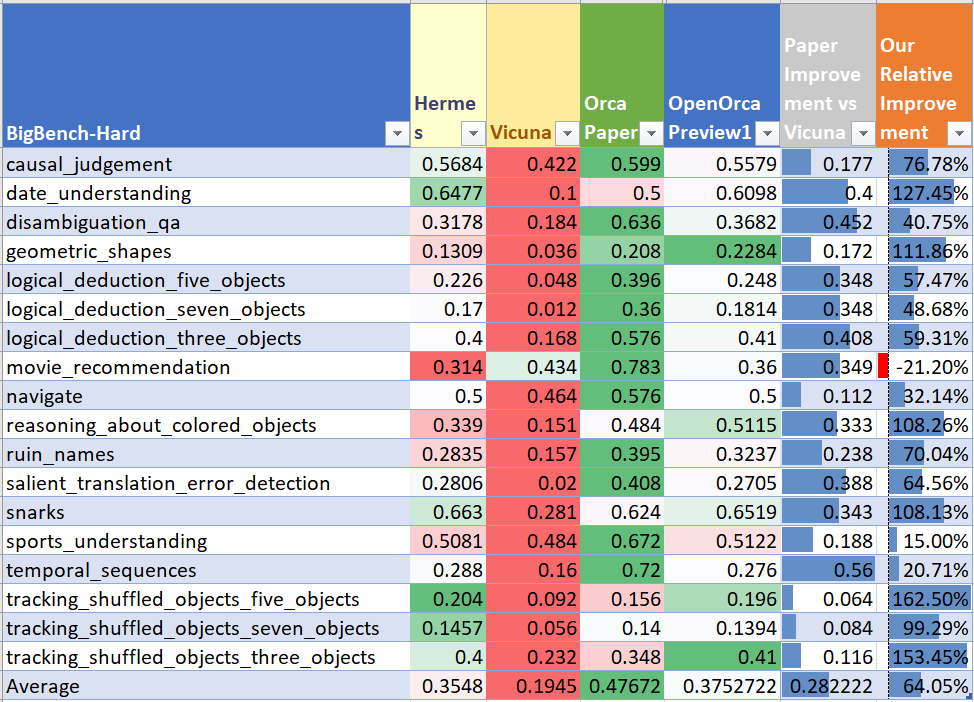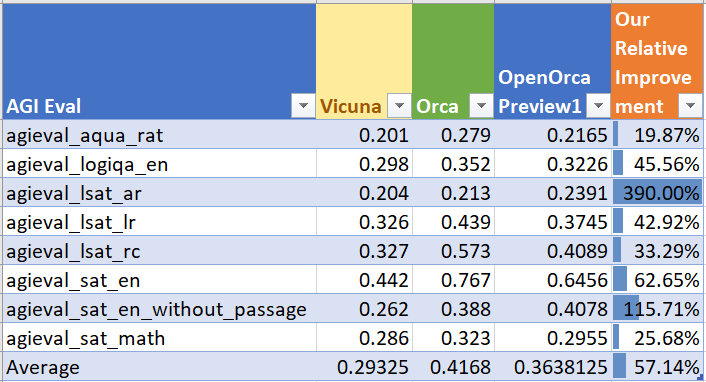
TheBloke's LLM work is generously supported by a grant from andreessen horowitz (a16z)
Open-Orca's OpenOrca-Preview1-13B GPTQ
These files are GPTQ model files for Open-Orca's OpenOrca-Preview1-13B.
Multiple GPTQ parameter permutations are provided; see Provided Files below for details of the options provided, their parameters, and the software used to create them.
These models were quantised using hardware kindly provided by Latitude.sh.
Repositories available
- GPTQ models for GPU inference, with multiple quantisation parameter options.
- 2, 3, 4, 5, 6 and 8-bit GGML models for CPU+GPU inference
- Open-Orca's unquantised fp16 model in pytorch format, for GPU inference and for further conversions
Prompt template: Alpaca
Below is an instruction that describes a task. Write a response that appropriately completes the request.
### Instruction: {prompt}
### Response:
Provided files
Multiple quantisation parameters are provided, to allow you to choose the best one for your hardware and requirements.
Each separate quant is in a different branch. See below for instructions on fetching from different branches.
| Branch | Bits | Group Size | Act Order (desc_act) | File Size | ExLlama Compatible? | Made With | Description |
|---|---|---|---|---|---|---|---|
| main | 4 | 128 | False | 7.45 GB | True | GPTQ-for-LLaMa | Most compatible option. Good inference speed in AutoGPTQ and GPTQ-for-LLaMa. Lower inference quality than other options. |
| gptq-4bit-32g-actorder_True | 4 | 32 | True | 8.00 GB | True | AutoGPTQ | 4-bit, with Act Order and group size. 32g gives highest possible inference quality, with maximum VRAM usage. Poor AutoGPTQ CUDA speed. |
| gptq-4bit-64g-actorder_False | 4 | 64 | False | 7.51 GB | True | AutoGPTQ | 4-bit, without Act Order and group size. Without Act Order to improve AutoGPTQ speed, and better accuracy than 128g-False. |
| gptq-4bit-64g-actorder_True | 4 | 64 | True | 7.51 GB | True | AutoGPTQ | 4-bit, with Act Order and group size. 64g uses less VRAM than 32g, but with slightly lower accuracy. Poor AutoGPTQ CUDA speed. |
| gptq-4bit-128g-actorder_True | 4 | 128 | True | 7.26 GB | True | AutoGPTQ | 4-bit, with Act Order and group size. 128g uses even less VRAM, but with slightly lower accuracy. Poor AutoGPTQ CUDA speed. |
| gptq-8bit--1g-actorder_True | 8 | None | True | 13.36 GB | False | AutoGPTQ | 8-bit, with Act Order. No group size, to lower VRAM requirements and to improve AutoGPTQ speed. |
| gptq-8bit-128g-actorder_True | 8 | 128 | True | 13.65 GB | False | AutoGPTQ | 8-bit, with group size 128g for higher inference quality and with Act Order for even higher accuracy. Poor AutoGPTQ CUDA speed. |
| gptq-8bit-128g-actorder_False | 8 | 128 | False | 13.65 GB | False | AutoGPTQ | 8-bit, with group size 128g for higher inference quality and without Act Order to improve AutoGPTQ speed. |
How to download from branches
- In text-generation-webui, you can add
:branchto the end of the download name, egTheBloke/OpenOrca_Preview1-200k-GPT4_LLaMA-13B-GPTQ:gptq-4bit-32g-actorder_True - With Git, you can clone a branch with:
git clone --branch gptq-4bit-32g-actorder_True https://huggingface.co/TheBloke/OpenOrca_Preview1-200k-GPT4_LLaMA-13B-GPTQ`
- In Python Transformers code, the branch is the
revisionparameter; see below.
How to easily download and use this model in text-generation-webui.
Please make sure you're using the latest version of text-generation-webui.
It is strongly recommended to use the text-generation-webui one-click-installers unless you know how to make a manual install.
- Click the Model tab.
- Under Download custom model or LoRA, enter
TheBloke/OpenOrca_Preview1-200k-GPT4_LLaMA-13B-GPTQ.
- To download from a specific branch, enter for example
TheBloke/OpenOrca_Preview1-200k-GPT4_LLaMA-13B-GPTQ:gptq-4bit-32g-actorder_True - see Provided Files above for the list of branches for each option.
- Click Download.
- The model will start downloading. Once it's finished it will say "Done"
- In the top left, click the refresh icon next to Model.
- In the Model dropdown, choose the model you just downloaded:
OpenOrca_Preview1-200k-GPT4_LLaMA-13B-GPTQ - The model will automatically load, and is now ready for use!
- If you want any custom settings, set them and then click Save settings for this model followed by Reload the Model in the top right.
- Note that you do not need to set GPTQ parameters any more. These are set automatically from the file
quantize_config.json.
- Once you're ready, click the Text Generation tab and enter a prompt to get started!
How to use this GPTQ model from Python code
First make sure you have AutoGPTQ installed:
GITHUB_ACTIONS=true pip install auto-gptq
Then try the following example code:
from transformers import AutoTokenizer, pipeline, logging
from auto_gptq import AutoGPTQForCausalLM, BaseQuantizeConfig
model_name_or_path = "TheBloke/OpenOrca_Preview1-200k-GPT4_LLaMA-13B-GPTQ"
model_basename = "openorca-preview1-200k-llama-13b-GPTQ-4bit-128g.no-act.order"
use_triton = False
tokenizer = AutoTokenizer.from_pretrained(model_name_or_path, use_fast=True)
model = AutoGPTQForCausalLM.from_quantized(model_name_or_path,
model_basename=model_basename
use_safetensors=True,
trust_remote_code=True,
device="cuda:0",
use_triton=use_triton,
quantize_config=None)
"""
To download from a specific branch, use the revision parameter, as in this example:
model = AutoGPTQForCausalLM.from_quantized(model_name_or_path,
revision="gptq-4bit-32g-actorder_True",
model_basename=model_basename,
use_safetensors=True,
trust_remote_code=True,
device="cuda:0",
quantize_config=None)
"""
prompt = "Tell me about AI"
prompt_template=f'''Below is an instruction that describes a task. Write a response that appropriately completes the request.
### Instruction: {prompt}
### Response:
'''
print("\n\n*** Generate:")
input_ids = tokenizer(prompt_template, return_tensors='pt').input_ids.cuda()
output = model.generate(inputs=input_ids, temperature=0.7, max_new_tokens=512)
print(tokenizer.decode(output[0]))
# Inference can also be done using transformers' pipeline
# Prevent printing spurious transformers error when using pipeline with AutoGPTQ
logging.set_verbosity(logging.CRITICAL)
print("*** Pipeline:")
pipe = pipeline(
"text-generation",
model=model,
tokenizer=tokenizer,
max_new_tokens=512,
temperature=0.7,
top_p=0.95,
repetition_penalty=1.15
)
print(pipe(prompt_template)[0]['generated_text'])
Compatibility
The files provided will work with AutoGPTQ (CUDA and Triton modes), GPTQ-for-LLaMa (only CUDA has been tested), and Occ4m's GPTQ-for-LLaMa fork.
ExLlama works with Llama models in 4-bit. Please see the Provided Files table above for per-file compatibility.
Discord
For further support, and discussions on these models and AI in general, join us at:
Thanks, and how to contribute.
Thanks to the chirper.ai team!
I've had a lot of people ask if they can contribute. I enjoy providing models and helping people, and would love to be able to spend even more time doing it, as well as expanding into new projects like fine tuning/training.
If you're able and willing to contribute it will be most gratefully received and will help me to keep providing more models, and to start work on new AI projects.
Donaters will get priority support on any and all AI/LLM/model questions and requests, access to a private Discord room, plus other benefits.
- Patreon: https://patreon.com/TheBlokeAI
- Ko-Fi: https://ko-fi.com/TheBlokeAI
Special thanks to: Aemon Algiz.
Patreon special mentions: Sam, theTransient, Jonathan Leane, Steven Wood, webtim, Johann-Peter Hartmann, Geoffrey Montalvo, Gabriel Tamborski, Willem Michiel, John Villwock, Derek Yates, Mesiah Bishop, Eugene Pentland, Pieter, Chadd, Stephen Murray, Daniel P. Andersen, terasurfer, Brandon Frisco, Thomas Belote, Sid, Nathan LeClaire, Magnesian, Alps Aficionado, Stanislav Ovsiannikov, Alex, Joseph William Delisle, Nikolai Manek, Michael Davis, Junyu Yang, K, J, Spencer Kim, Stefan Sabev, Olusegun Samson, transmissions 11, Michael Levine, Cory Kujawski, Rainer Wilmers, zynix, Kalila, Luke @flexchar, Ajan Kanaga, Mandus, vamX, Ai Maven, Mano Prime, Matthew Berman, subjectnull, Vitor Caleffi, Clay Pascal, biorpg, alfie_i, 阿明, Jeffrey Morgan, ya boyyy, Raymond Fosdick, knownsqashed, Olakabola, Leonard Tan, ReadyPlayerEmma, Enrico Ros, Dave, Talal Aujan, Illia Dulskyi, Sean Connelly, senxiiz, Artur Olbinski, Elle, Raven Klaugh, Fen Risland, Deep Realms, Imad Khwaja, Fred von Graf, Will Dee, usrbinkat, SuperWojo, Alexandros Triantafyllidis, Swaroop Kallakuri, Dan Guido, John Detwiler, Pedro Madruga, Iucharbius, Viktor Bowallius, Asp the Wyvern, Edmond Seymore, Trenton Dambrowitz, Space Cruiser, Spiking Neurons AB, Pyrater, LangChain4j, Tony Hughes, Kacper Wikieł, Rishabh Srivastava, David Ziegler, Luke Pendergrass, Andrey, Gabriel Puliatti, Lone Striker, Sebastain Graf, Pierre Kircher, Randy H, NimbleBox.ai, Vadim, danny, Deo Leter
Thank you to all my generous patrons and donaters!
And thank you again to a16z for their generous grant.
Original model card: Open-Orca's OpenOrca Preview1 200k GPT4 LLaMA 13B
🐋 The First OpenOrca Model Preview! 🐋
OpenOrca-Preview1-13B
We have used our own OpenOrca dataset to fine-tune LLaMA-13B. This dataset is our attempt to reproduce the dataset generated for Microsoft Research's Orca Paper.
We have trained on less than 6% of our data, just to give a preview of what is possible while we further refine our dataset! We trained a refined selection of 200k GPT-4 entries from OpenOrca. We have filtered our GPT-4 augmentations to remove statements like, "As an AI language model..." and other responses which have been shown to harm model reasoning capabilities. Further details on our dataset curation practices will be forthcoming with our full model releases.
This release highlights that even a small portion of our training data can produce state of the art results in this model class with training costs <$200 in total.
We are in-process with training more models, so keep a look out on our org for releases coming soon with exciting partners.
We will also give sneak-peak announcements on our Discord, which you can find here:
Evaluation
We have evaluated OpenOrca_Preview1-200k-GPT4_LLaMA-13B on hard reasoning tasks from BigBench-Hard and AGIEval as outlined in the Orca paper.
Our average performance for BigBench-Hard: 0.3753
Average for AGIEval: 0.3638
In the Orca paper, they measured their score relative to Vicuna on these evals. We've done the same and have found our score averages to ~60% of the total improvement that was shown in the Orca paper.
So we got 60% of the improvement with 6% of the data!
BigBench-Hard Performance
AGIEval Performance
We will report our results on HuggingFaceH4 Open LLM Leaderboard Evals once we receive them.
Dataset
We used a small (6%, 200k) subset of our data from OpenOrca, which aims to reproduce the Orca Research Paper dataset.
As this release is intended as a preview, please await our full releases for further details on the training data.
Training
We trained with 8x A100-80G GPUs for 15 hours. Commodity cost was < $200.
We trained for 4 epochs and selected a snapshot at 3 epochs for peak performance.
Please await our full releases for further training details.
Citation
@software{OpenOrca_Preview1,
title = {OpenOrca_Preview1: A LLaMA-13B Model Fine-tuned on Small Portion of OpenOrcaV1 Dataset},
author = {Wing Lian and Bleys Goodson and Eugene Pentland and Austin Cook and "NanoBit" and "Teknium"},
year = {2023},
publisher = {HuggingFace},
journal = {HuggingFace repository},
howpublished = {\url{https://https://huggingface.co/Open-Orca/OpenOrca_Preview1-200k-GPT4_LLaMA-13B},
}
@misc{mukherjee2023orca,
title={Orca: Progressive Learning from Complex Explanation Traces of GPT-4},
author={Subhabrata Mukherjee and Arindam Mitra and Ganesh Jawahar and Sahaj Agarwal and Hamid Palangi and Ahmed Awadallah},
year={2023},
eprint={2306.02707},
archivePrefix={arXiv},
primaryClass={cs.CL}
}
@misc{longpre2023flan,
title={The Flan Collection: Designing Data and Methods for Effective Instruction Tuning},
author={Shayne Longpre and Le Hou and Tu Vu and Albert Webson and Hyung Won Chung and Yi Tay and Denny Zhou and Quoc V. Le and Barret Zoph and Jason Wei and Adam Roberts},
year={2023},
eprint={2301.13688},
archivePrefix={arXiv},
primaryClass={cs.AI}
}
@software{touvron2023llama,
title={LLaMA: Open and Efficient Foundation Language Models},
author={Touvron, Hugo and Lavril, Thibaut and Izacard, Gautier and Martinet, Xavier and Lachaux, Marie-Anne and Lacroix, Timoth{\'e}e and Rozi{\`e}re, Baptiste and Goyal, Naman and Hambro, Eric and Azhar, Faisal and Rodriguez, Aurelien and Joulin, Armand and Grave, Edouard and Lample, Guillaume},
journal={arXiv preprint arXiv:2302.13971},
year={2023}
}
- Downloads last month
- 6

